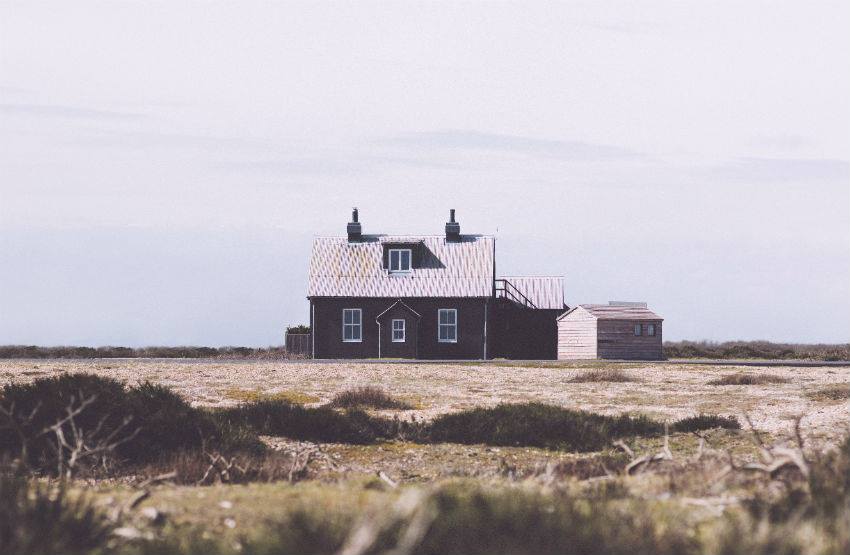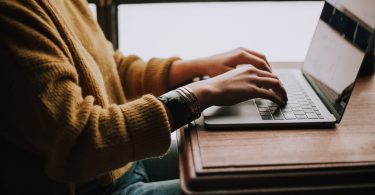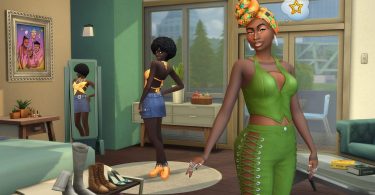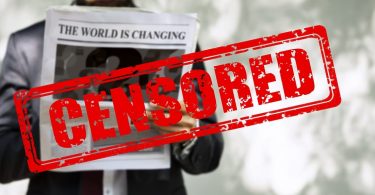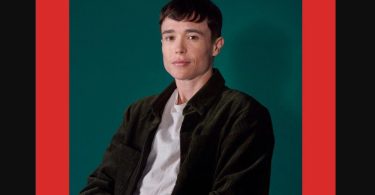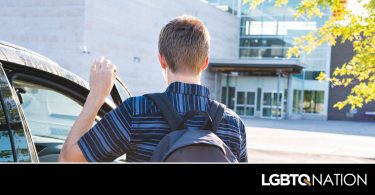‘When a man is tired of London, he is tired of life,’ famed English writer Samuel Johnson said back in the 1700s. He was inferring that the city was offering everything someone might want from life.
Many LGBTI people, in particular, gravitate towards big cities in search of acceptance, love and a more cosmopolitan atmosphere. It’s the reason gay neighborhoods are common in the world’s largest metropolis.
For some, the idea of living in such places is a dream. But for others, that dream loses its appeal. And for a wide variety of reasons.
As part of its Founders Day series, Gay Star News talked to gay men who left relative gay hotspots for more rural lives.
Jay Blotcher
Jay and his husband formerly lived in New York City. He was an early, active member of ACT UP New York in the 1980s.
Why did you decide to move out of the city?
Since about 1998, my husband Brook [Garrett] and I found ourselves with a strange feeling: a sudden weariness and lack of excitement towards our adopted city.
It was changing — and not in a way we liked. When Brook and I announced to NYC friends of our plans in the summer of 2001 to leave NYC, the skepticism was profound.
Everybody had deemed me a veteran, true-blue New Yorker (I’m originally from the suburbs of Boston) and predicted that I would last a few months in a rural area.
We just marked 17 years in Ulster County (NY). Even though we were living in the friendly, cozy, funky West Village, where it’s a small town within the metropolis, fancy upscale stores and tall buildings were beginning to impinge upon that small-town vibe.
That insult, coupled with soaring prices and a sharp drop in quality of life, fueled our decision to leave. Happily, my husband Brook agreed with me to move.
Did you have any fears before making the move – and were any of those fears realized?
There was an initial fear that there wouldn’t be work for me when I arrived in the Hudson Valley. There was; I began writing for all of the magazines in the region. But the fees were so anemic that I found myself with a humbling income that was far below my NYC income.
Mind you, the cost of living up here is much less, but still I had a few tough years until I found more work.
What do you miss about living in your former city?
When I think about what I miss, I realize I am missing the past. I am missing the bohemian energy of the Village, the dynamic of running into people I know and making spontaneous plans, the sexiness of cruising.
Even if I were to move back to NYC tomorrow, all those attributes are no longer there. It’s a far more frantic, fragmented, and obscenely expensive city. And many friends from the past have relocated or are casualties of the AIDS epidemic.
If pressed for another answer, I miss the plethora of cultural offerings of my former city: films, theatre, concerts. While we have a vibrant arts community up here in the Mid-Hudson Valley, nothing compares to NYC for culture, admittedly.
What do you love about living where you are now?
I used to approach the frustrations of NYC living with the energy and defiance of a young man. After awhile, the game grew tiresome. Now I live in a hamlet of 600 people called High Falls. I know a lot of people and can get things done up here much more easily, without the signature red tape and egos of NYC life.
I am a volunteer for several local groups and pitch in to create fundraisers, fun happenings and educational events. That is a tonic.
Last week, I was judge of the High Falls Pet Show. In two weeks, I am the emcee of a Dog Trivia Night fundraiser for the local kennel. And I provide ongoing pro bono PR for the Ulster County Historical Society. I feel so much more connected up here now, as I did in NYC when I was at the epicenter of the AIDS epidemic as a member of ACT UP.
Are attitudes towards gay people different compared to where you used to live?
My husband and I were so enchanted by this rural area that, admittedly, we did not think of the possible challenges facing gays and lesbians up here. We knew that these people thrived, but they tended to hide in plain sight.
Three years after we arrived, the Mayor of New Paltz, NY, taking the cue of San Francisco Mayor Gavin Newsom, held a same-sex marriage event and wedded 24 couples. One of them was us. This placed our area on the global map as a place that welcomed same-sex couples. The event transformed this area.
That year, an LGBT magazine appeared and I became a contributor. The next year, 2005, we had our first LGBT pride march in New Paltz, which I co-organized, and 1,000 people showed up. And the year after that, I was co-founder of the Hudson Valley LGBTQ Community Center, which opened in 2007. The evolution has been dizzying and empowering.
Could you envisage ever moving back into a major city?
I go back to NYC every six weeks for business. Where once I saw energizing excitement, now I only see neurotic confusion and chaos. The noise, the dirt, the prices, the pollution, the lack of living space or walking space, all reassure me that I made the right choice 17 years ago.
Do you miss living nearer a larger number of LGBTI people?
We have a large and ever-growing LGBT community up here, lured by the 2004 New Paltz weddings, and nurtured by the Hudson Valley LGBTQ Community Center. And the number of gay weekender couples that come here seems to grow every year.
How would you say your quality of life has changed?
Astronomically. We live in an affordable three-story house and have a backyard. We live near woods and animals. We’re deeply rooted in the community and various events, culturally and politically. I can walk outside and breathe in beautiful oxygen, not the exhaust of ten thousand cars.
I’m not only happier — NYC life was turning me into a grumpy old queen — but my artistic output has exponentially grown since we relocated. I have written hundreds of articles, edited several books, have been working on a musical that is heading for the stage and, as stated before, have served as the volunteer publicist for several local organizations. I couldn’t imagine a better third act to my life.
Does living somewhere remote appeal to you? (Photo: Unsplash)
David H Baldwin
David H Baldwin is a former air traffic controller. In 2015, he sued the US Federal Aviation Authority over discrimination in a case that has since being drawn upon in other LGBT discrimination cases.
Why did you decide to move out of the city?
After retiring from ATC/FAA in Miami, I sought refuge from the chaos of that career and the madness of living in South Florida and commuting from Fort Lauderdale to MIA daily.
New Orleans seemed a good change at first but my partner and I separated after several years there and I found myself alone in a big empty house with a cat and a dog. The silence became deafening and the social opportunities for a single gay male approaching 60 in New Orleans are limited at best compared to South Florida.
My choice was a unique compromise to move into an old seaside cottage I own outside of Pensacola, FL. It’s a beautiful old historic city located in the Florida Panhandle that is very easy to live in, has breathtaking beaches, friendly residents, and low crime.
In my youth I loved the night life of the French Quarter, but this chapter of my life brings an entirely new perspective that doesn’t involve staying up all night.
Waking up to stunning waterfront scenery and a more relaxed pace of life drew me to this destination as if it was always meant to be. I’ve nicknamed the place Gull Cottage, after the movie, The Ghost and Mrs Muir, as the circumstances of my own life and this house are hauntingly similar.
I bought this house with my partner in 1993 and he died 13 months later from AIDS. I have sought refuge here on so many occasions in my life, but always haunted by survivors guilt, watching the years go by and growing grey and older, all the time mourning the loss of a love of so many years ago. Sometimes it all seems so scripted.
Did you have any fears before making the move – and were any of those fears realized?
I’m still in the process of making the move although I spend most of my time in Florida. My New Orleans is on the market but is almost completely empty and I just keep a crash pad there.
This situation has acted as a tryout and I can clearly see that living in Pensacola can get claustrophobic especially in the winter months as the summer tourists add something extra to the flair of living here.
I need to be challenged and I fear the suffocation of a small city. On some levels this is true here and the remedy is to leave and go somewhere else for a short stay.
What do you miss about living in your former city?
Costco, Trader Joe’s, real seafood poboy’s [a traditional Louisiana sandwich], lots of bakeries, a million other foodie things, and a bigger population of individuals who don’t give a damn what anyone thinks of them. Sometimes the conservatism of a small city can be overwhelming.
What do you love about living where you are now?
Some of the most stunning beaches in the world are right by my house. I go swimming off of my pier and watch dolphins play in the water in my backyard. I drive into Pensacola daily and swim laps in a new huge YMCA. And I get my haircut by the oldest barber in America. Joe is 102 years and does a great job too!
The laid back atmosphere and lack of city noise and crime has definitely had a significant positive impact on my daily life.
Are attitudes towards gay people different compared to where you used to live?
Pensacola is much more conservative but is rapidly evolving to a more positive space. This area has a huge military presence with many different bases and commands. With LGBT acceptance throughout the military now this has been an enormous overnight sea change for this area and will continue to do so rapidly as the demographic of the past ages out.
Could you envisage ever moving back into a major city?
I am almost certain that I will be moving back to a city that offers a bigger LGBT population and social culture at some point. The time I have spent living in this seaside community has been therapeutic and rejuvenating but this area lacks services for an aging LGBT population that are on my long term horizon.
Do you miss living nearer a larger number of LGBTI people?
Without question, I miss having a large group of gay guys to hangout with and not just at church. Hanging out by the pool at Club Fort Lauderdale is a fun thing to do that you’ll not likely experience in a small town. The Pride Center in Wilton manors offers a wealth of activities, health care and classes that are simply beyond comparison and add tremendously to the life of the residents of South Florida.
How would you say your quality of life has changed?
Taking time away from big city life quieted the noise in my life and allowed me to focus on the parts of my life that I had always ignored. I had always wanted to explore my intuitive talents and I finally found a group that practices metaphysical healing in Pensacola.
I now appear at Unity and MCC Churches along the Gulf coast several times a month as a volunteer healer and have found an unexpected source of joy in my life by helping others in theirs.
Pierre
Pierre asked us to not to use his full name. He is 50, and works as a librarian in Midcoast Maine.
Why did you decide to move out of the city?
After a long-term relationship ended, I was alone in San Francisco. Struggling with depression and sobriety, I decided I was going to die if I didn’t make a significant and drastic change, immediately.
People were dropping all around me from depression, addiction, and HIV. I loved San Francisco and it was home, but it was also killing me, along with a large percentage of gay men with similar addictions.
So many of our generation also have childhood PTSD from before the days families and communities were supportive. I found that it was very hard for me to achieve sobriety, even in a gay mecca, because of the relentless temptations.
Did you have any fears before making the move – and were any of those fears realized?
I moved to Maine, where I grew up. And yes I had a lot of fears, because I’m familiar with small town life.
They were all realized, as expected: isolation, there isn’t a large LGBT population to connect to where I live, loneliness: almost zero dating options. I can’t find compatible men to date; there are literally none. We’re relatively distant from Boston, NYC, and Montreal, though they’re all easy to drive to for long weekends, and urban getaways.
What do you miss about living in your former city?
Here I’m always in a very small minority of LGBT people. I always feel like an outsider more than I feel connected. However, San Francisco is no longer the city I loved, and on my last visit I realized I was lucky to move when I did, before everyone I knew was driven out by the extremely high costs.
I dislike what San Francisco has become. It isn’t home anymore, and I haven’t wished to return since my last visit in 2011. It’s lost its heart and soul, and visiting is now very bittersweet.
What do you love about living where you are now?
My life is relatively drama-free. I’m employed and love my job. I love my apartment, a much nicer apartment than any city could provide. A smaller town for me is better for maintaining recovery. I can afford to live here, and save for retirement.
There isn’t much violent crime here, and people are mostly friendly and accepting. It’s now much more diverse than when I returned in 2000.
Are attitudes towards gay people different compared to where you used to live?
Yes. In San Francisco I was in the majority, I finally felt comfortable in my own skin for the first time in my life, but here I’m once again in the minority.
People are mostly nice and mostly have a very Maine/Puritan ‘live and let live’ attitude, and if what you do doesn’t affect them, they’ll let you be. They believe, rightly so, that it’s none of their business.
We were the first state to legalise gay marriage by popular vote, with Delaware. It surprised me when my current town voted for marriage equality. Unlike in California, I do find myself code switching periodically in certain questionable situations though, so I don’t sound gay.
Could you envisage ever moving back into a major city?
My plan was to return to San Francisco after my parents died, when I had less family ties here. I can no longer afford to live there. And most everyone I know and loved has fled for more affordable, manageable places, all over the United States, many back to their home states.
While I never planned on staying here permanently, the only places I’d be tempted to move, like London or Chicago or New York City, are too expensive for me at this age. I like having an intact retirement fund. Almost all of my city friends have nothing saved as they enter their fifties.
Do you miss living nearer a larger number of LGBTI people?
Yes, every minute, every hour, every day. I’m always ‘the token gay’ here and I get extremely tired of being so. Not being in a thriving LGBT community causes its own issues with loneliness, sobriety, and depression.
Thankfully, I have an online LGBT community and also an online LGBT recovery community. Thanks to technology, I’ve very close to a lot of people I’ve never met in person, and these connections are every bit as valuable and rewarding as face to face relationships. I’d prefer they be here, but sometimes it’s that, or nothing.
How would you say your quality of life has changed?
Overall, I cannot complain about my quality of life, because if I hadn’t relocated, I wouldn’t be alive today.
So, my quality of life is quite good; I’ve survived. While I’m not living where I thought I’d be, or where I wanted to end up, I am living. This has become home, and it’s mostly a positive life I have.
See also
3 out of 4 LGBTI people want LGBTI nursing and retirement homes
Gay men over 45 far more likely to be single – and these are the reasons why

